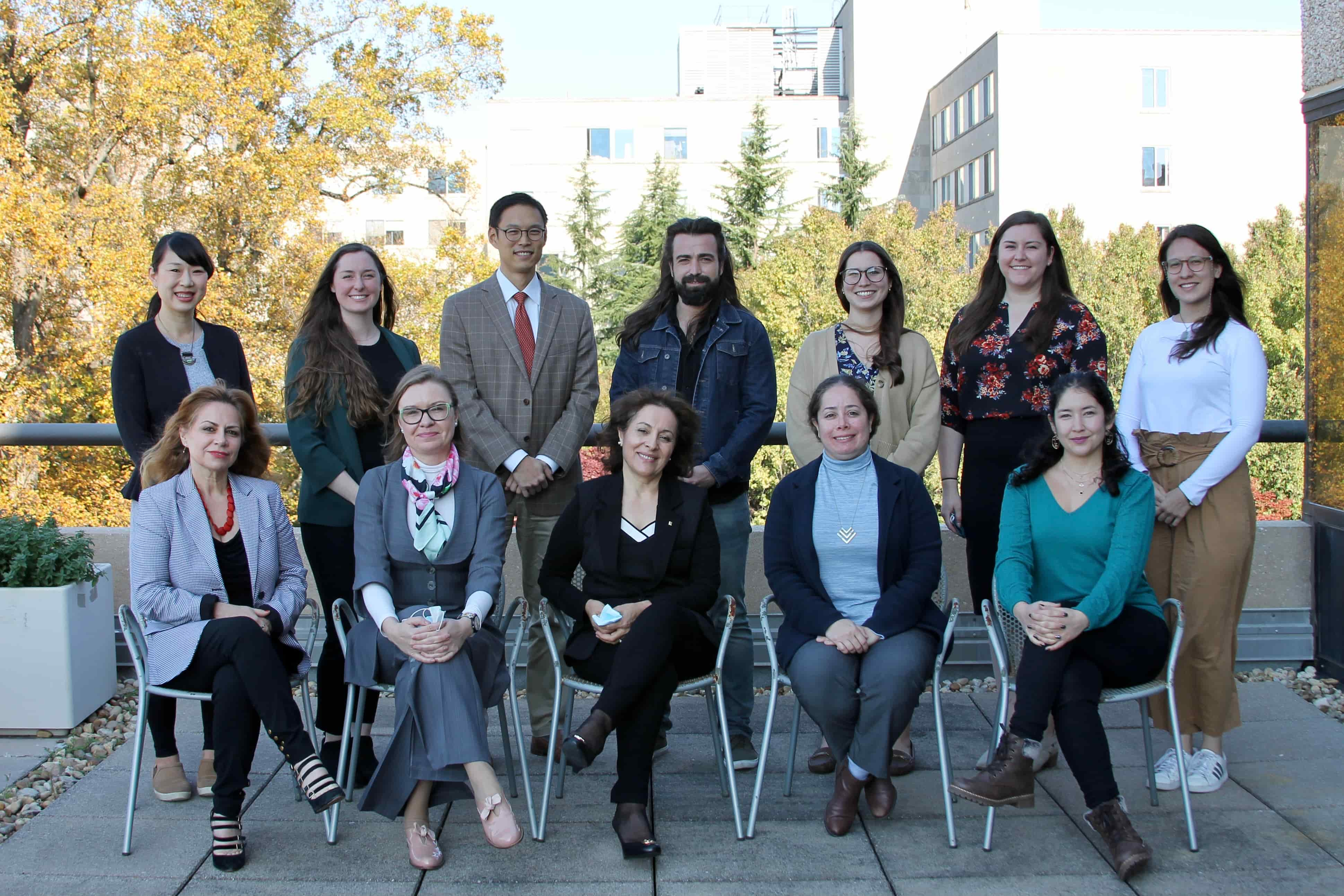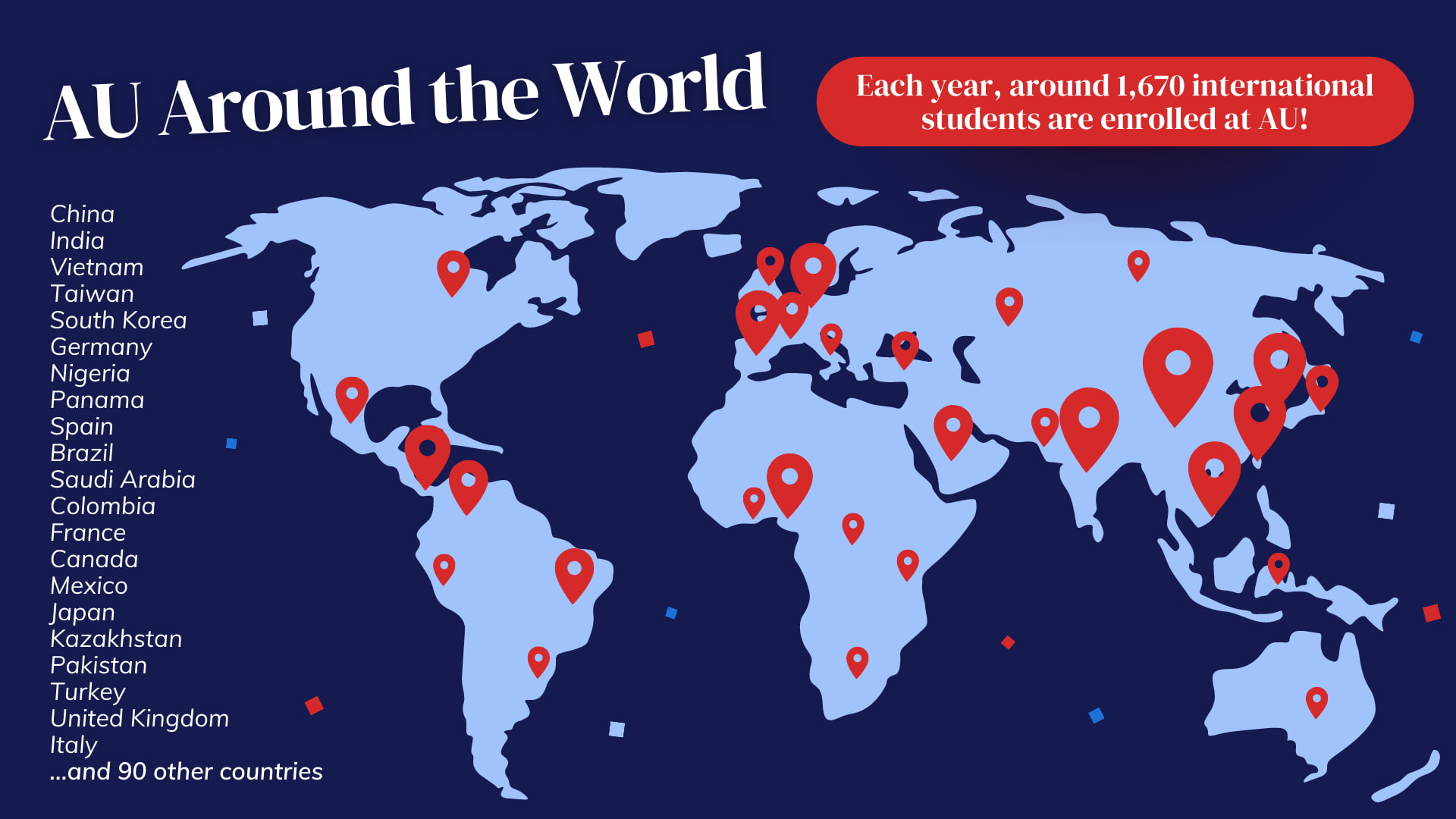Bringing the World to AU
Each year, around 1670 international students enroll at AU from around the world. That’s the average over the past decade – the actual number changes – but it’s about 10 percent of all students. The backgrounds of these global Eagles are diverse, but one thing they share is that all of them connect, at many points in their journey, with the staff at the International Student and Scholar Services (ISSS).
What does it take to help all these students enroll, arrive, navigate the university system, feel at home, and make the most of their AU educations? Precision and a big heart! That may be a surprising combination, but at ISSS, one without the other won’t accomplish the goal – or, for that matter, make an advisor feel fulfilled in their daily work. While the immigration services require precision, a big heart is a must for making meaningful and lasting connections with students who are thousands of miles away from their homes.
This year, as we celebrate International Education Week amid the return to mostly in-person learning, I am struck by the ways the pandemic has highlighted the complexity of the international student experience and what, precisely, ISSS does to support it.
 ISSS staff (left to right, top to bottom): Yui Itokawa, Shannon Conheady, James Choi, Cem Yatagan, Alyssa Sistare, Nicole Powers, Angelica Londono Borja, Fatmira Hoxha, Anna Tigan, Senem Bakar, Juliana Fernandes, Paloma Molina.
ISSS staff (left to right, top to bottom): Yui Itokawa, Shannon Conheady, James Choi, Cem Yatagan, Alyssa Sistare, Nicole Powers, Angelica Londono Borja, Fatmira Hoxha, Anna Tigan, Senem Bakar, Juliana Fernandes, Paloma Molina.
First, though, let’s look at what may be the most common question asked at AU about ISSS: “How do you say your office’s name, anyway? Is it ‘I Triple S,’ or ‘I-S-S-S’?”
The answer: whichever you prefer! The office’s name, like its role, can be looked at or described in more than one way. It’s a global gateway to personal dreams. It’s a guide through the maze of visa regulations. And it’s been a home away from home for tens of thousands of Eagles from over 140 countries for over 50 years.
Home Away from Home
For many decades, AU had a single Foreign Student Advisor, Dr. Ernst Correll, who served all students from 1929 to 1959. The office itself was established in 1968 and as the world changed, so did the office. It grew under directors Gary Wright (1988-1998) and Fanta Aw (1998-2013), along with the international student population.
The pandemic brought about a new challenge that highlighted the complexity of the international student experience. For domestic students, the decision to enroll once admitted is made by the student and family. International students face many additional factors, which multiplied in the pandemic, including decision factors imposed by home countries, the U.S. government, and the World Health Organization (WHO).
The pandemic was the latest change in a landscape that has long been evolving. When I started at AU in 1992, we did not have the Internet, and hearing about it for the first time was like trying to understand the space program. Even trying to pronounce the old term “world wide web” was a tongue twister – and for those of us with an accent, it was a unique challenge. While the internet has brought the world together in many ways, the challenges of living and studying in another culture far from home have remained significant.
That brings up a big part of the role of ISSS: to become a “home” that empathizes with differences and supports a diverse student body hailing from around the globe.
For international students, the journey starts as they think of applying. For us, as their guides, it starts by providing clear and easy-to-follow resources for prospective and incoming students long before meeting them in person. When they finally arrive on campus for ISSS Orientation, it’s enormously satisfying to finally meet the students we supported through immigration and visa hurdles.

Connections
Starting with orientation, we connect international students with our office, each other, domestic students, staff, and faculty. Though some activities are currently on hold due to the pandemic, they have typically included a theme-based global café series, Fall Gala, and Spring Festival to encourage meeting and mingling.
Other programs continue virtually despite the pandemic, such as the ISSS Language Exchange Program, which pairs about 200 domestic and international students each semester for language learning and cultural exchange, as well as the Transitioning Beyond re-entry program. As students prepare to graduate, we help them transition beyond AU by providing them with invaluable internal and external resources so they can leverage their international advantage in the US job search or for successful re-entry to their home cultures.
As recent alum Miriam Komuhendo (CAS/MS ’20) wrote, “You took me under your wing from the first time we met and stuck with me till the end. I literally could not have done it without your help every step of the way. You blessed me beyond my wildest imagination and introduced me to the ISSS family, I think of you as my guardian angel.”
After graduation, ISSS is still responsible for immigration advising and compliance reporting for students who engage in post-graduation employment in the U.S. This process may take as long as three years and is part of the U.S. government’s national security measures mandated for ISSS offices, which starts after a student’s admission to the university and continues until they either leave the country or move out of their F-1 (student visa) or J-1 (exchange visitor) immigration status.
The extended regulatory responsibility also creates a unique opportunity for the ISSS team to know more about our graduates and hear heartwarming post-graduation stories, both personal and career related. Some of those international students with AU degrees became prominent leaders in their countries or worldwide, including two current presidents: Julius Maada Bio (SIS/MIS ’01), President of Sierra Leone, and Ivan Duque Martinez (WCL/LLM ’04), President of Colombia.
I would be a remiss if I did not mention the prominent J-1 scholars at AU. ISSS works with academic units to facilitate opportunities for numerous academics, artists, researchers, and government officials to enter the U.S. as exchange visitors for teaching or research. Often, they publish articles or author book chapters with AU faculty and lecture at other prominent universities as guest lecturers, while enriching AU intellectual life tremendously. The J-1 scholars become AU’s unique ambassadors upon returning to their institutions, labs, or government offices around the world.
Wherever the student’s or scholar’s path takes them in the future, they leave an impression on us. The ISSS office is filled with cultural artifacts to help us enjoy a lasting memory. Some also find us on different social media platforms years later to tell us about the lasting impact of ISSS on their lives. My heart soars with gratitude each time when this happens.
And in the words of my team member Anna Tigan, ISSS associate director: “My job allows me to travel around the world every day without leaving my office.”
Senem Bakar is Director of International Student and Scholar Services (ISSS).
